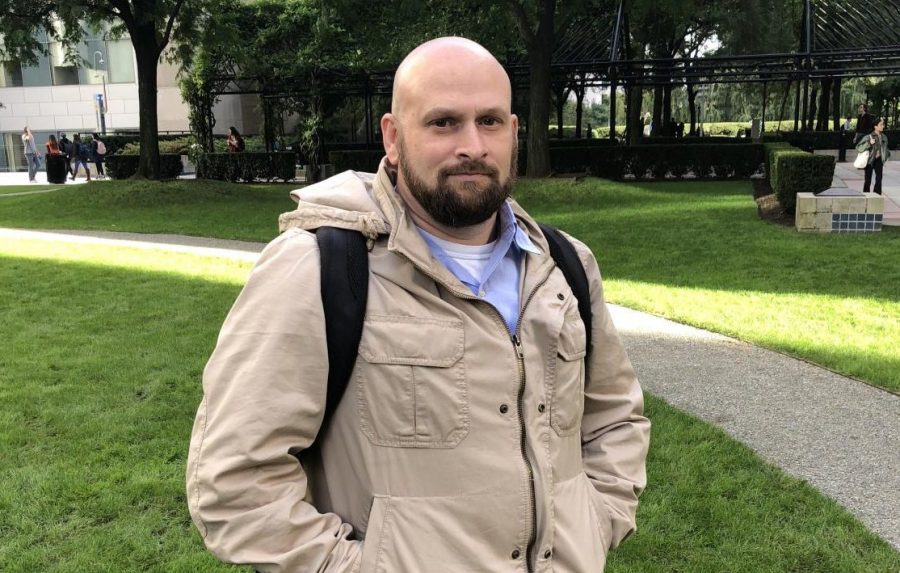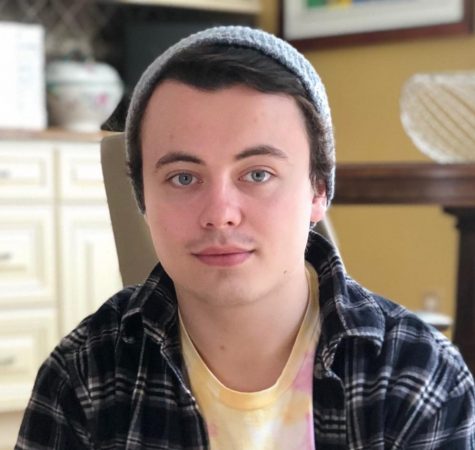Twenty-One Years Later, Veteran Returns to School
JORDAN MELTZER/THE OBSERVER
After serving in the air force, working as a corrections officer and enrolling in culinary school, John Wesley is pursuing an undergraduate degree at Fordham College at Lincoln Center.
November 7, 2018
“You know what? I’ll do that.”
John Wesley, Fordham College at Lincoln Center (FCLC) ’20, didn’t say this when going to Starbucks or picking an outfit. He said it when he decided to enlist in the Air Force in 1997.
Wesley’s choice to join the military was a change of heart that happened, quite literally, overnight. A self-proclaimed “goofball” who had just been kicked out of high school at the age of 18, he was working two jobs: one as a waiter and one as a gas station attendant. One Saturday, a revelation suddenly hit him when he was filling up tanks at the gas station.
“I had an epiphany watching cars go by, and I was like, ‘I’m never getting this back again if I don’t do something,’” he recalled. “So that was Saturday morning. Monday morning, I went and signed up for the Air Force.”
“I saw my life passing before my eyes.”
A native of Piscataway, NJ, Wesley felt a desperation and a longing familiar to many: to get out of his hometown and do something meaningful. His lust for life had brought him to the Air Force, and he would not settle for an assignment close to home. So, despite his initial post in New Jersey, within six months of that fateful Monday morning, he was in Kuwait.
“That’s where I turned 21 years old,” he said. Wesley has deployed to Ali Al Salem Air Base, about 20 miles from the Iraq border. “It was crazy. We used to find unexploded ordinances everywhere.”
Part of Wesley’s job was to search unknown vehicles and entire localities for hidden bombs. This was no small task: the lives of countless individuals were in the hands of a young kid who was voted “Class Clown” in high school. It whipped him into shape. He knew there was no room for jokes anymore. He called it a “culture shock,” but, ultimately, he was thankful for it. “That deployment set the precedent for the rest of my deployments. It made me headstrong.”
Wesley’s later tours took him to Saudi Arabia, the United Arab Emirates, Oman and Iraq. During his time in Saudi Arabia, he was stationed at a base built by the Bin Laden family-owned Saudi Binladin Group, which is the largest construction company in the Middle East.
Just a few years prior to Wesley’s deployment to Saudi Arabia, an incident occurred there that inspired that shift to seriousness. During the Khobar Towers bombing of 1996, two “goofballs” — “And like I said, I identify with being a goofball” — were sitting on top of the towers, where they were not permitted to be. Suddenly, a garbage truck pulled up, and two men got out and sprinted away from it. The boys tried to warn others in the area, but it was too late. Their lives were two that were taken among the 19 that died that day.
Wesley learned an important lesson from that horrific attack: “Just don’t ever become complacent with stuff. Because you never know. That time you become complacent, it’s that one time that something hits. It’s really important that you pay attention and just do your job. The one time you become complacent, that’s a wrap.”
For Wesley, Iraq was the worst deployment. In addition to substantial heavy bombing that targeted his Air Force base, he committed something of a cinematic save: While many of his fellow troops were sleeping, he helped stop five terrorists from breaking into their base. As he was repairing the television at their base, he saw five figures in thermal imaging that were trying to climb over the fence at the base. He alerted the rest of the team, and they captured the intruders. For this act, he earned an Air Force Commendation Medal.
When reflecting on the medal, he shrugged it off: “Yeah, that was pretty cool.”
Wesley’s service in the military would come to an end after six tours lasting 1,538 days — he rattled off this number with ease — but that was not the only service to others he conducted. Following the conclusion of his time in the Air Force, he spent five years working as a corrections officer. Then, for another two, he taught children with behavior problems. Far cries from a waiter and a gas station attendant.
“I kind of got into the psychology of things and why people do things,” he explained. “These kids were abused and coming to me — to not only teach these teenage boys life skills, but also as a confidante and someone who was there to protect them from their parents and stuff like that.”
He began cooking for these teenagers. Many of them didn’t have appropriate supplies or ingredients in their homes, so Wesley often brought his own. When some of the boys suggested he attend culinary school, he initially dismissed the comments. But then: another epiphany.
Wesley ended up taking classes at New York City’s Institute for Culinary Education. After his time at the institute, he decided to take his education in a new direction: online courses. He took an accounting course and, in his own words, “completely bombed it.” He decided he needed to attend a traditional brick-and-mortar university so he could experience face-to-face instruction from professors. After overhearing a conversation about education at — of all places — a restaurant, he was subjected to a shining review of Fordham University and its veterans program. The rest is history.
“So, actually, kids started my education,” he deduced. “Teenage boys. The kids that had problems — I actually learned a lot about myself through them. You know, patience, nurturing. Stuff I didn’t think I had.”
Now 40 years old, Wesley lives with his oldest son in New Jersey. He has plans for Fordham and beyond, which is something he couldn’t say as an 18-year-old goofball. He wants to combine his eagerness to learn with his passion for culinary arts and start his own restaurant.
“I actually spoke to [Gabelli Dean Donna Rapaccioli] at the career fair,” he said. “She sent me an email already … I went to culinary school. I have some pretty good plans as far as setting that stuff up.”
Twenty-one years passed between Wesley’s final day in Piscataway High School and his first day at Fordham. Transforming from high school expellee, to Commendation Medal recipient, to corrections officer, to chef, to FCLC student and, finally, to prospective entrepreneur is an exceptional path, and one that is bound to change a person in a myriad of ways. But he was keen to offer some wisdom and advice about his journey thus far: “Self-recognition. You need to know a lot about yourself.”
He went on: “You take everything more seriously when you’ve done this stuff. For myself, being older, I’m like, ‘Damn, I’m revamping myself again.’ So you’ve got to change with the times. So that’s what I’m doing now.











